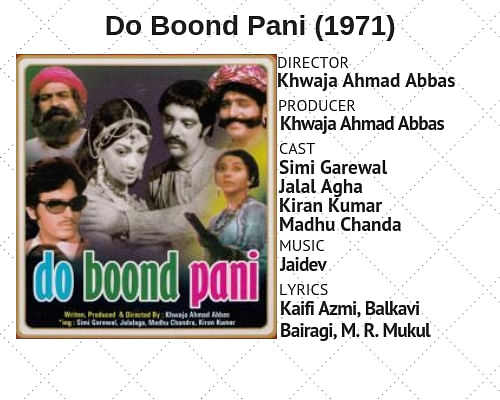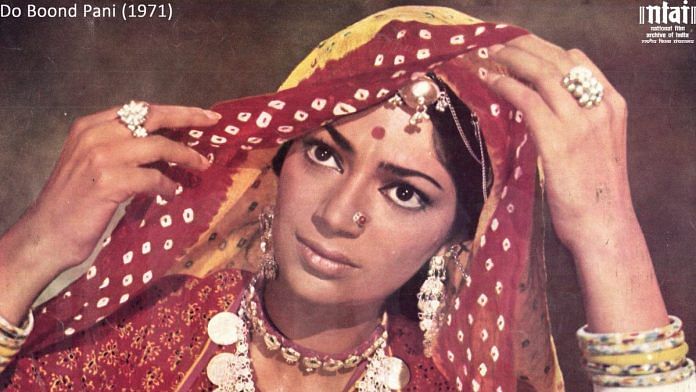Water is life. And no one showed it better than K.A. Abbas in his 1971 film Do Boond Pani.
Drought can have far-reaching consequences, and the film takes the viewer through each of those painful moments. As big cities like Chennai grapple with water crisis, Do Boond Pani is a timely reminder of what Day Zero could be like.
 Starring a young Simi Garewal, Jalal Agha and Sajjan, Do Boond Pani is a story of a newly-married couple, Ganga Singh (Agha) and Gauri (Garewal), living in a poor village in Rajasthan. They live hand to mouth with Ganga Singh’s father (Sajjan) and sister Sonki (Madhu Chanda).
Starring a young Simi Garewal, Jalal Agha and Sajjan, Do Boond Pani is a story of a newly-married couple, Ganga Singh (Agha) and Gauri (Garewal), living in a poor village in Rajasthan. They live hand to mouth with Ganga Singh’s father (Sajjan) and sister Sonki (Madhu Chanda).
Originally a village of farmers, everyone is forced to take up new livelihoods because the village has not received rain in the last seven years.
Gauri is an educated and intelligent woman. When a travelling film company screens a government feature on an under-construction dam that is set to bring water to arid Rajasthan, she encourages Ganga Singh to go work at the dam site.
He leaves, wanting to make his water-obsessed father and new wife proud, and ignoring his friend’s advice of rather going to the city and earning money. As he learns to manage modern equipment from a friendly officer (Kiran Kumar) at the dam construction site, he soon realises what bureaucracy can do to the most well-intentioned projects. In the meantime, misfortune of every kind befalls his little village and his family, and eventually even him. In the end, he does succeed in his quest – but only after paying a heavy price.
Also read: Not water, Chennai has a governance crisis. This ex-IAS officer has the solution
What really stands out in this film is the narrative technique, although some may find the film a bit slow. The theme of drought and water crisis runs all through the film as an undercurrent to the central story of a man doing his bit for his family and proving his worth and a woman protecting her family at any cost.
The characters, too, are well fleshed-out and layered.
Ganga Singh comes off as naïve in the beginning, but gradually shows growth and maturity. Gauri, who is arguably the protagonist here, is not afraid of speaking her mind. Ganga Singh, in fact, admires his wife’s intelligence.
His father is a tired, old man who represents the wisdom of hindsight, and constantly reminds everyone about the value of water.
The officer at the dam construction site represents the government and its slow-paced work, as well as the privilege that the upper class enjoys over the poor in times of crisis.
The songs, mostly written by Kaifi Azmi, also revolve around water and play an integral part in taking the story forward.
Authenticity is key here, with accurate representation of life in a water-scarce village – visitors are served milk and not water, thanks to the scarcity of the latter; bathing is a luxury; women do the heavy-lifting by walking miles to get a little water.
The second-half of the film exposes the broken government system. The inefficiency and shoddy execution of welfare projects provoke frustration and anger among villagers.
Do Boond Pani shows how water crisis hits everyone, including the privileged – forcing mass displacement, causing unemployment (those in agrarian economy lose jobs), triggering health and safety issues and eventually, in some cases, leading to loss of life, all because of thirst.
Also read: Chennai water crisis is a man-made disaster. Other Indian metros may suffer the same fate



